Dear Zazie, Here is today’s Lovers’ Chronicle from Mac Tag to his muse. Follow us on twitter @cowboycoleridge. What do you know? Have you told that someone what you know? Rhett
The Lovers’ Chronicle
Dear Muse,
oh yes you do
“We do”
no song lyrics leap to mind
“Without don’t, I agree”
how many do and how often
do those, find someone who does
“I hope it is not rare”
for dramatic effect
and for the dark spot i have,
it does not happen often
“All the more reason
we sould feel fortunate”
that we do
© copyright 2023 mac tag/cowboycoleridge all rights reserved
© copyright 2021 mac tag/cowboy coleridge all rights reserved
you know that i am
more near to you
than anyone
spent years,
too many,
afraid to look
into some
of the rooms
in my mind
not fearful anymore
been in all of ’em
finally figured out
i just had to write
to make sense of it all
© copyright 2019 mac tag/cowboy coleridge all rights reserved
all these years
all these memories
it has been you
you know
that i am
what means it then
to be sundered so
if hopes are true
if expectancy
breaks down
what between stands
for bein’ without
is endurable
because you know
be not, therefore
need not burn
need not cry
come
that we may know
what was meant to be
© copyright 2018 mac tag/cowboycoleridge
i sure ain’t found
the answer
truth is,
i never understood
the language
b’lieve i will stick
with horses
And another oldie but goodie. This started out as a vignette that I sent you. Then I read a poem today written by Michelangelo and it all came together. Hope you like……
You Know
You know
What I wish
What I need
What I think
What I want
What I would do
What I would be doin’
What I long for and yearn for and ache for
How it could be
How it should be
Where I would be
Who I would be with
What I hope
What I dream
What I believe
You know
You know
You know that I am here
More near to you than anyone
I know, you know
What means it then that we are sundered so
If these hopes that flow from you are true,
If this sweet expectancy is not fantasy,
Help break down what between us stands
For bein’ without you is not endurable
Because in you I love, because I know
What you know best, be not therefore afraid
Souls need not burn for souls,
Spirits need not cry for spirits
Come, that we may know the splendour
Together we can find what was meant for us,
That which only together we can know
© copyright 2013 mac tag/Cowboy Coleridge all rights reserved
The Song of the Day is “You Know You Know” by the Mahavishnu Orchestra. Also check out this song which was based on “You Know You Know”, “One Love” by Massive Attack. We do not own the rights to these songs. All rights reserved by the rightful owner. No copyright infringement intended.
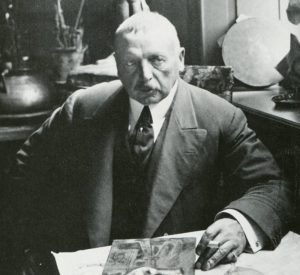 Today is the birthday of artist Anders Zorn (Anders Leonard Zorn; Yvraden, Mora, Dalarna, Sweden 18 February 1860 – 22 August 1920 Stockholm). He obtained international success as a painter, sculptor, and etcher. At the end of his life, he established the Swedish literary Bellman Prize in 1920.
Today is the birthday of artist Anders Zorn (Anders Leonard Zorn; Yvraden, Mora, Dalarna, Sweden 18 February 1860 – 22 August 1920 Stockholm). He obtained international success as a painter, sculptor, and etcher. At the end of his life, he established the Swedish literary Bellman Prize in 1920.
From 1875 to 1880 Zorn studied at the Royal Swedish Academy of Arts in Stockholm, where he amazed his teachers with his talent. Members of Stockholm society approached him with commissions. This was how Zorn met his wife, Emma Lamm, early in 1881. Her background was different from Zorn’s. Coming from a wealthy Jewish merchant family, she was interested in art and culture.
Gallery
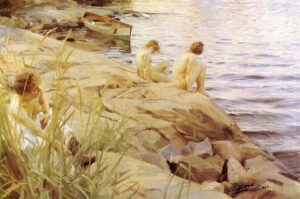
Nude bathers



- Portrait paintings
-

The King of Sweden, King Oscar II , 1898.
-

The Queen consort of Sweden and Norway, Queen Sophia 1909
-

The Painter Bruno Liljefors, 1906
-

William Howard Taft, 27th President of the United States 1911
-

Mr Henry Clay Pierce, a noted financier and oil industry pioneer, 1899
-

Mrs. Frances Cleveland, the wife of President Grover Cleveland
-

President Grover Cleveland
-

Ambassador David Jayne Hill
-
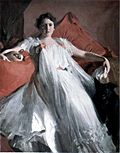
Mme Ashley, 1920
-

Lady with fur cape
-
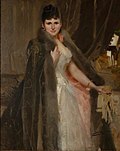
Mrs. Symons
-

Mrs Walter Rathbone Bacon
-
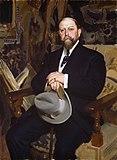
Hugo Reisinger holding a fashionable grey Homburg hat, 1907.
-

Mrs. Potter Palmer
-

Mrs. Eben Richards
- Self Portraits
-
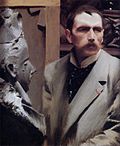
Self portrait, undated
-

Self portrait, 1882
-

Self Portrait with Model, 1896
-

Self Portrait with Hat1907
-

Self-portrait in red, 1915
-

Self Portrait with Faun and Nymph (before 1920)
- Nudes
-

Freya, 1901
-
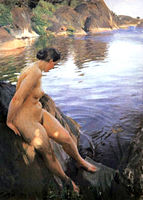
Woman bathing at Sandhamn, 1906
-
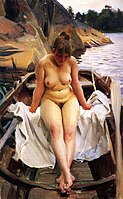
Woman in a boat, 1917
-
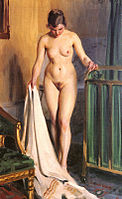
In the bedroom, 1918
-

Studio Idyll, 1918
-

A Portrait of the Daughters of Ramón Subercaseaux, 1892
-
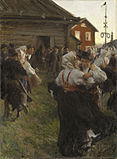
Midsummer Dance, 1897
-

Dalecarlian Girl Knitting. Cabbage Margit, 1901
-

Hins Anders, fiddler or spelman, 1904 (Thielska Galleriet)
-

A Musical Family, 1905
-

Dance in Gopsmor, 1906
-
Ols Maria, 1918
-
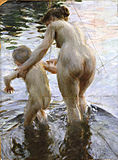
En premiär, (1888).
-

Girls from Dalarna Having a Bath, 1906
-
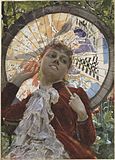
Castles in the Air, 1885
-
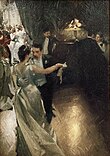
Waltz
-

Omnibus I, 1892 or 1895
-

An Irish Girl, 1894, National Gallery of Art
| Wallace Stegner | |
|---|---|

Wallace Stegner, c. 1969
|
|
Today is the birthday of Wallce Stegner (Wallace Earle Stegner, Lake Mills, Iowa, February 18, 1909 – April 13, 1993 Santa Fe); novelist, short story writer, environmentalist, and historian, often called “The Dean of Western Writers”. He won the Pulitzer Prize in 1972 and the U.S. National Book Award in 1977.
Stegner grew up in Great Falls, Montana; Salt Lake City, Utah; and the village of Eastend, Saskatchewan, which he wrote about in his autobiography Wolf Willow. Stegner says he “lived in twenty places in eight states and Canada”. He received a B.A. at the University of Utah in 1930. He also studied at the University of Iowa, where he received a master’s degree in 1932 and a doctorate in 1935.
In 1934, Stegner married Mary Stuart Page. For 59 years they shared a “personal literary partnership of singular facility”, in the words of Arthur Schlesinger Jr. Stegner died in Santa Fe, New Mexico, on April 13, 1993, as the result of a car accident on March 28, 1993.
Prose
- It is a better world with some buffalo left in it, a richer world with some gorgeous canyons unmarred by signboards, hot-dog stands, super highways, or high-tension lines, undrowned by power or irrigation reservoirs. If we preserved as parks only those places that have no economic possibilities, we would have no parks. And in the decades to come, it will not be only the buffalo and the trumpeter swan who need sanctuaries. Our own species is going to need them too.It needs them now.
- This is Dinosaur: Echo Park Country and its Magic Rivers is a collection of essays and photographs edited by Wallace Stegner and published by Alfred A. Knopf in 1955. This passage is from the collection’s first essay, “The Marks of Human Passage”, which is by Stegner (page 17).
- It has never been man’s gift to make wildernesses. But he can make deserts, and has.
- “The War Between the Rough Riders and the Bird Watchers” (1959 address; reprinted in Wildlands and Our Civilization, David Brower, editor, 1964, and in Voices for the Wilderness, William Schwarz, editor, 1970, page 76)
- There is a sense in which we are all each other’s consequences.
- All the Little Live Things (1967)
- If the national park idea is, as Lord Bryce suggested, the best idea America ever had, wilderness preservation is the highest refinement of that idea.
- “It All Began with Conservation” Smithsonian magazine, April 1990, pages 35-43
- The national park idea, the best idea we ever had, was inevitable as soon as Americans learned to confront the wild continent not with fear and cupidity but with delight, wonder, and awe.
- “The Best Idea We Ever Had” Marking the Sparrow’s Fall: The Making of the American West, page 137
Wilderness Letter (1960)[edit]
A 3 December 1960 letter to David Pesonen, concerning the wilderness portion of the Outdoor Recreation Resources Review Commission’s report. Reprinted many times, for example, in The Sound of Mountain Water(1969) and Marking the Sparrow’s Fall (1998).
- Something will have gone out of us as a people if we ever let the remaining wilderness be destroyed; if we permit the last virgin forests to be turned into comic books and plastic cigarette cases; if we drive the few remaining members of the wild species into zoos or to extinction; if we pollute the last clear air and dirty the last clean streams and push our paved roads through the last of the silence, so that never again will Americans be free in their own country from the noise, the exhausts, the stinks of human and automotive waste. And so that never again can we have the chance to see ourselves single, separate, vertical and individual in the world, part of the environment of trees and rocks and soil, brother to the other animals, part of the natural world and competent to belong in it. … We need wilderness preserved — as much of it as is still left, and as many kinds — because it was the challenge against which our character as a people was formed. The reminder and the reassurance that it is still there is good for our spiritual health even if we never once in ten years set foot in it.
-
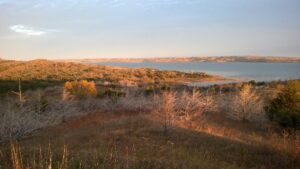
Photo by mac tag
It is a lovely and terrible wilderness, such as wilderness as Christ and the prophets went out into; harshly and beautifully colored, broken and worn until its bones are exposed, its great sky without a smudge of taint from Technocracy, and in hidden corners and pockets under its cliffs the sudden poetry of springs.
- These are some of the things wilderness can do for us. That is the reason we need to put into effect, for its preservation, some other principle that the principles of exploitation or “usefulness” or even recreation. We simply need that wild country available to us, even if we never do more than drive to its edge and look in. For it can be a means of reassuring ourselves of our sanity as creatures, a part of the geography of hope.
- She had rooms in her mind that she would not look into.
- We write to make sense of it all.
- Be proud of every scar on your heart, each one holds a lifetime’s worth of lessons.
Mac Tag



No Comments on "The Lovers’ Chronicle 18 February – you know – art by Anders Zorn – prose by Wallace Stegner"